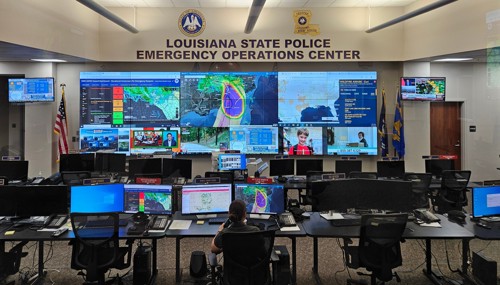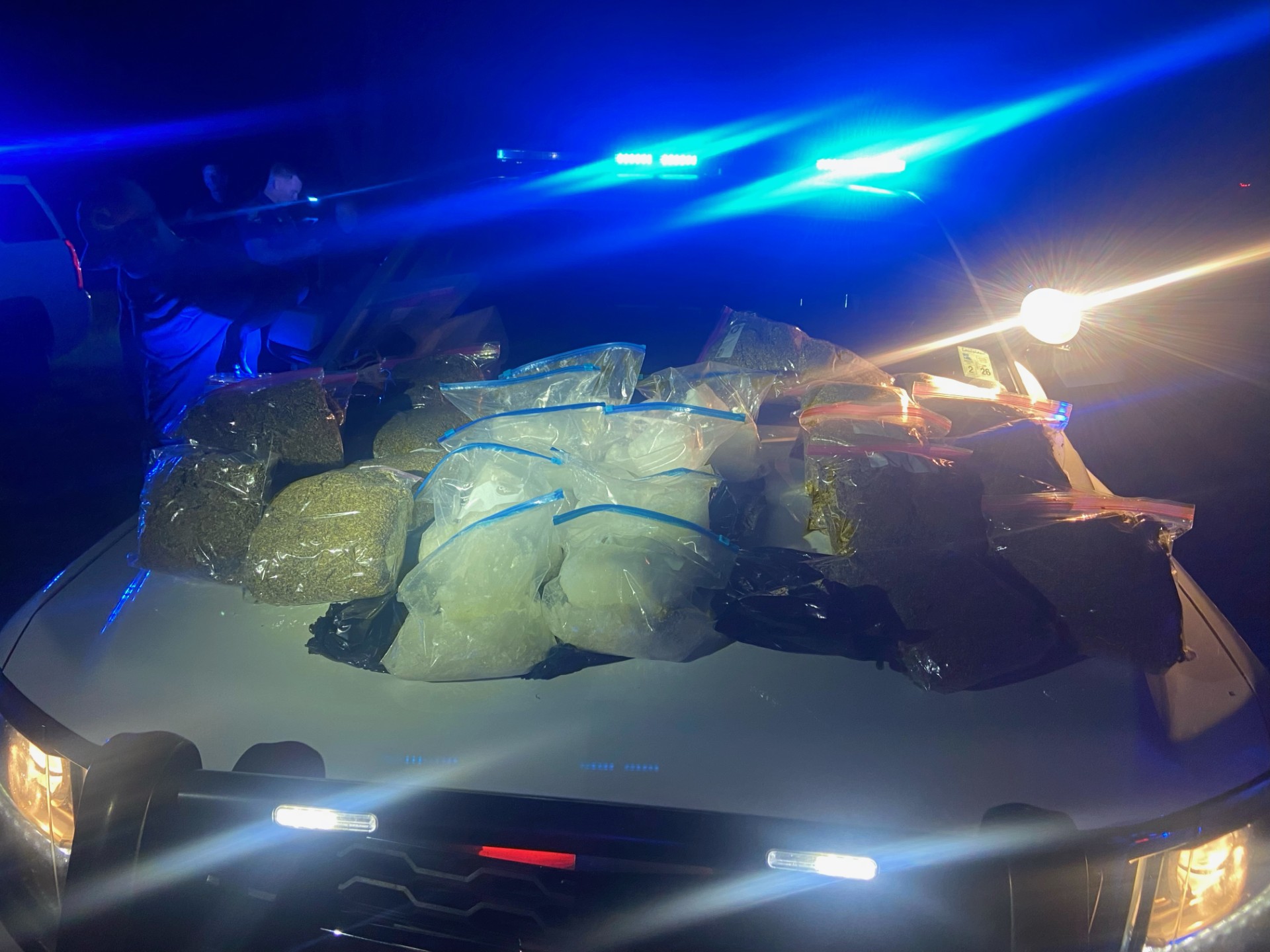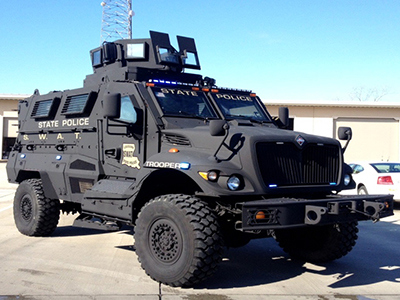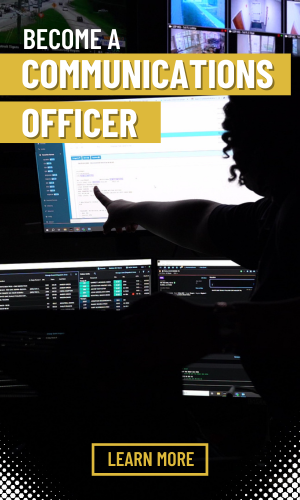CRISIS RESPONSE
The Crisis Response Command is comprised of the Emergency Operations Center (EOC), Statewide Communications Unit, Criminal Patrol Unit (CPU), Mobile Field Force (MFF), Special Weapons and Tactics (SWAT), and Mobile Command Post (MCP) Deployment. The Crisis Response Command provides the highest level of operational support to all sections of the Louisiana State Police, as well as, local, state, and federal agencies.
Emergency Operations Center (EOC)
Address: 7667 Independence Blvd., Baton Rouge, LA 70806
Phone: 225-287-7704
Fax: 225-287-7786
 The Louisiana State Police Emergency Operations Center (EOC) is a state-of-the-art command and control center co-located with the Governor's Office of Homeland Security and Emergency Preparedness on the Louisiana State Police Headquarters campus. From this location, members of the Critical Incident Management Staff (CIMS) coordinate disaster planning, response and mitigation to critical incidents. In addition, the EOC serves as a base of operations for high profile security operations and Departmental support for other agencies.
The Louisiana State Police Emergency Operations Center (EOC) is a state-of-the-art command and control center co-located with the Governor's Office of Homeland Security and Emergency Preparedness on the Louisiana State Police Headquarters campus. From this location, members of the Critical Incident Management Staff (CIMS) coordinate disaster planning, response and mitigation to critical incidents. In addition, the EOC serves as a base of operations for high profile security operations and Departmental support for other agencies.
The Crisis Response staff and CIMS members are able to monitor major evacuation routes via the Louisiana Department of Transportation and Development's Intelligent Transportation Systems (ITS) network to provide real time information during an evacuation. The staff is also able to view major facets of Louisiana's critical infrastructure through video monitoring equipment.
The EOC plays a crucial role in critical incident management for the Louisiana State Police. It has been activated for a wide variety of events, including response to inclement weather, high-profile security details for Presidential visits and Gubernatorial Inaugurations, emergency response activities such as hazardous materials incidents, the Space Shuttle Columbia disaster, and multi-jurisdictional law enforcement operations. The EOC was fully operational during Hurricanes Katrina and Rita in 2005, Gustav and Ike in 2008, Isaac in 2012, floods in 2016, Delta and Zeta in 2020, and the Winter storm in 2021. Additionally, the EOC was partially operational for Extreme Heat and Wildfires in 2023, the Ice Storm in 2024, and Hurricane Francine in 2024. The EOC also plays a vital role in the execution of the Strategic National Stockpile (SNS) Program when implemented in Louisiana by the Department of Health and Hospitals.
The EOC is equipped with communication, mapping and intelligence gathering technology designed to increase situational awareness and facilitate information dissemination. All EOC systems have built in redundancy features to ensure uninterrupted service to the citizens of Louisiana.
Resources for the Public
As part of the Louisiana Emergency Operations Plan, the Louisiana State Police (LSP) has primary responsibility for the following Emergency Support Functions (ESF): ESF-2 (Communications), ESF-10 (Oil Spill, Hazardous Materials and Radiological), and ESF-13 (Public Safety and Security). In addition, LSP has support responsibility for the following ESF functions: ESF-1 (Transportation), ESF-5 (Emergency Management), ESF-6 (Mass Care, Emergency Assistance, Housing and Human Services), ESF-7 (Resources Support), ESF-9 (Search and Rescue), ESF-14 (Community Recovery, Mitigation and Economic Stabilization), and ESF-15 (Emergency Public Administration).
For road closures, call the Louisiana Department of Transportation and Development (DOTD) at 877-4LA-DOTD (visit online at 511la.org), or Louisiana State Police at 800-469-4828 (visit online at lsp.org).
For contraflow and additional evacuation information, please see the Louisiana Emergency Preparedness Guide.
Return to Top
Statewide Communications Unit
ABOUT
 The Louisiana State Police (LSP) Statewide Communications Unit is comprised of three (3) Regional Communications Centers. Region 1 is located in the LSP Emergency Operation Center - Baton Rouge, Region 2 is located at Troop I – Lafayette, and Region 3 is located at Troop E - Alexandria. Each Regional Communications Center operates 24 hours per day, 7 days a week, and serves as a Secondary Public Safety Answering Point (PSAP) to the regional 911 centers. The LSP Regional Communications Centers provide critical communication links between field personnel and their respective Command regions.
The Louisiana State Police (LSP) Statewide Communications Unit is comprised of three (3) Regional Communications Centers. Region 1 is located in the LSP Emergency Operation Center - Baton Rouge, Region 2 is located at Troop I – Lafayette, and Region 3 is located at Troop E - Alexandria. Each Regional Communications Center operates 24 hours per day, 7 days a week, and serves as a Secondary Public Safety Answering Point (PSAP) to the regional 911 centers. The LSP Regional Communications Centers provide critical communication links between field personnel and their respective Command regions.
The LSP Statewide Communications Unit is supervised by a civilian Communications Director who reports to the Crisis Response Commander. Daily operations of the Regional Communications Centers are directly supervised by a Communications Manager, while each shift is led by a Communications Officer Supervisor.
LSP Statewide Communications Unit personnel are actively engaged in all facets of law enforcement communications, including routine daily radio traffic, pursuits, fugitive search and apprehension, hazardous material incidents, and natural disasters, including the multiple catastrophic hurricanes that have devastated Louisiana’s coast. Moreover, the Statewide Communications Unit has also provided radio support for Presidential visits, Gubernatorial Inaugurations, special events such as Mardi Gras and Jazz Fest, and sporting events such as multiple Super Bowls, BCS National Championship, Bayou Classic, Sugar Bowl, WrestleMania, and multiple Men and Women’s Final Fours.
The LSP Statewide Communications Unit also provides a continuous radio communications gateway to other law enforcement and state agencies in Louisiana utilizing the P25 700 MHz system known as the Louisiana Wireless Interoperability Network (LWIN). Furthermore, the unit assumes responsibility for monitoring the Hazardous Materials Reporting Hotline, State Fire Marshal Emergency Line, Louisiana State Police Suspicious Activity Reporting Hotline, and incident reporting for the River Bend, Grand Gulf, and Waterford III nuclear facilities during evening, weekend, and holiday hours.
Criminal Patrol Unit (CPU)

Throughout the late 1980s and into the 1990s, law enforcement agencies across the nation began recognizing the need to form proactive patrol units. The Louisiana State Police (LSP) Criminal Patrol Unit (CPU) is a specialty unit coordinated from within the Crisis Response Section, comprised of nine teams statewide, each located at a Troop.
LSP CPU teams are a group of highly motivated and skilled Troopers, to include narcotic-trained canines, whose mission is to proactively patrol major interstate corridors throughout the state with the goal of identifying, apprehending, and removing dangerous criminals from the roadways of Louisiana.
Special Weapons and Tactics (SWAT)
 The Louisiana State Police (LSP) Special Weapons and Tactics (SWAT) team comprises three 21-member tactical platoons and three 7-member crisis negotiation squads, organized by region. SWAT members serve alongside their regular duties and are called upon for high-risk incidents beyond traditional law enforcement capabilities, such as warrant services, public event security, and hostage or barricade situations.
The Louisiana State Police (LSP) Special Weapons and Tactics (SWAT) team comprises three 21-member tactical platoons and three 7-member crisis negotiation squads, organized by region. SWAT members serve alongside their regular duties and are called upon for high-risk incidents beyond traditional law enforcement capabilities, such as warrant services, public event security, and hostage or barricade situations.
LSP SWAT maintains readiness through extensive training, including bi-monthly platoon and firearms exercises, monthly crisis negotiation drills, and an annual joint training exercise. Specialized personnel include 12 Counter-Snipers and 12 Breachers, who are highly trained in advanced sniper tactics and breaching techniques.
SWAT collaborates with other LSP units, such as the Air Support Unit, Mobile Field Force, and Emergency Services Unit, to expand its operational capabilities. The Air Support Unit enables rapid deployment, transporting up to 14 SWAT operators anywhere in Louisiana, including offshore. Additionally, the Aerial Platform Operations program enhances helicopter sniper deployment for critical missions.
SWAT also provides tactical support during civil disturbances and benefits from robotic equipment and hazardous materials expertise from the Emergency Services Unit. In 2010, LSP SWAT formed the Louisiana Maritime Special Response Team (LMSRT) in partnership with the Louisiana Department of Wildlife and Fisheries, combining maritime expertise with tactical response capabilities.
LSP SWAT remains at the forefront of the tactical community by providing exemplary leadership, utilizing advanced tactics and technology, and continually expanding its resources. The unit is proud to hold active membership in the National Tactical Officer's Association (NTOA), Louisiana Tactical Police Officers' Association (LTPOA), National Council of Negotiation Associations (NCNA), and the Louisiana Association of Crisis Negotiators (LACN).
Special Ops Links
Emergency Operations Center Links
- Governor’s Office of Homeland Security & Emergency Preparedness (GOHSEP)
- Louisiana Office of State Fire Marshal (SFM)
- Louisiana Oil Spill Coordinator’s Office (LOSCO)
- Office of the Louisiana Attorney General (AG)
- Louisiana National Guard (LANG)
- Louisiana Department of Transportation and Development (DOTD)
- Louisiana Department of Wildlife and Fisheries (LDWF)
- Louisiana Department of Corrections (DOC)
- Louisiana Office of Alcohol and Tobacco Control (ATC)
- Louisiana Department of Culture, Recreation, and Tourism (DCRT)
- Louisiana Department of Agriculture & Forestry (LDAF)
- Louisiana Department of Children & Family Services (DCFS)
- Louisiana Department of Environmental Quality (DEQ)
- Louisiana Department of Health & Hospitals (DHH)
- Louisiana Sheriffs' Association (LSA)
- Louisiana Association of Chiefs of Police (LACP)
- Mississippi Highway Patrol (MHP)
- Mississippi Department of Transportation (MDOT)
- Federal Emergency Management Agency (FEMA)
- United States Department of Homeland Security (DHS)
- Federal Bureau of Investigation (FBI)
- Bureau of Alcohol, Tobacco, Firearms, and Explosives (ATF)
- National Hurricane Center (NHC)
- The Weather Channel
Contact
Captain Jason Shavers - Commander
Phone: 225-287-7783
Fax: 225-287-7786
Lieutenant Joshua Nations – Executive Officer
Phone: 225-922-0680
Fax: 225-287-7786





